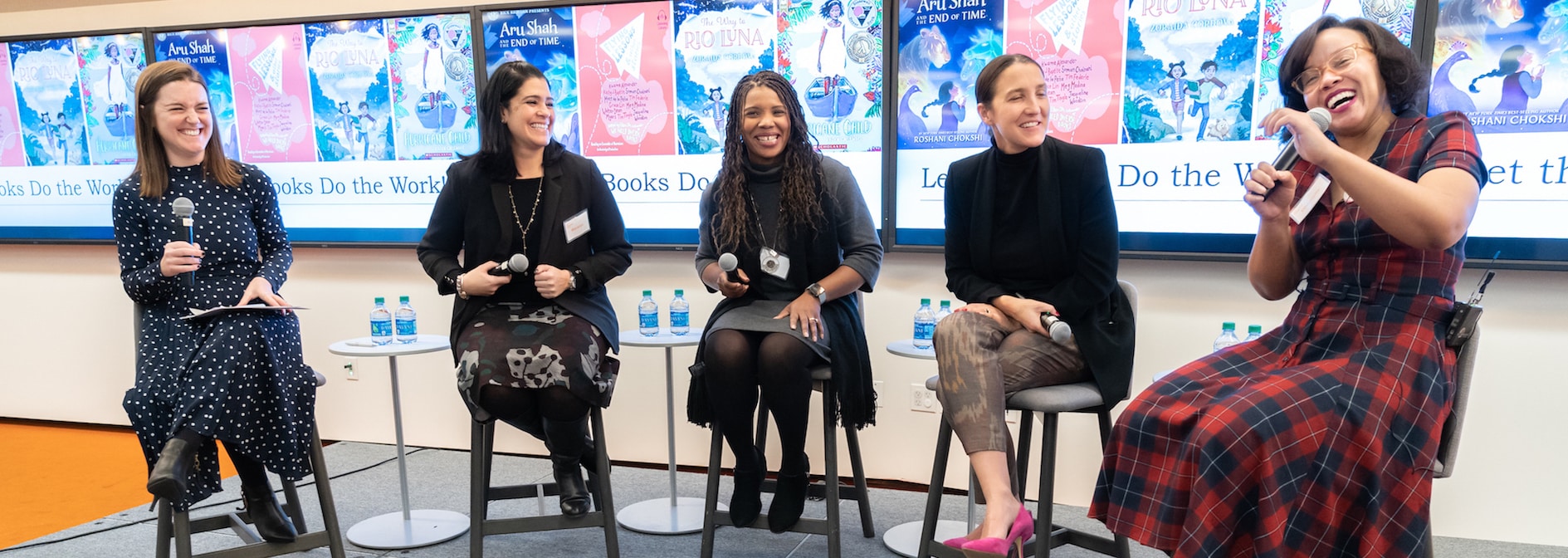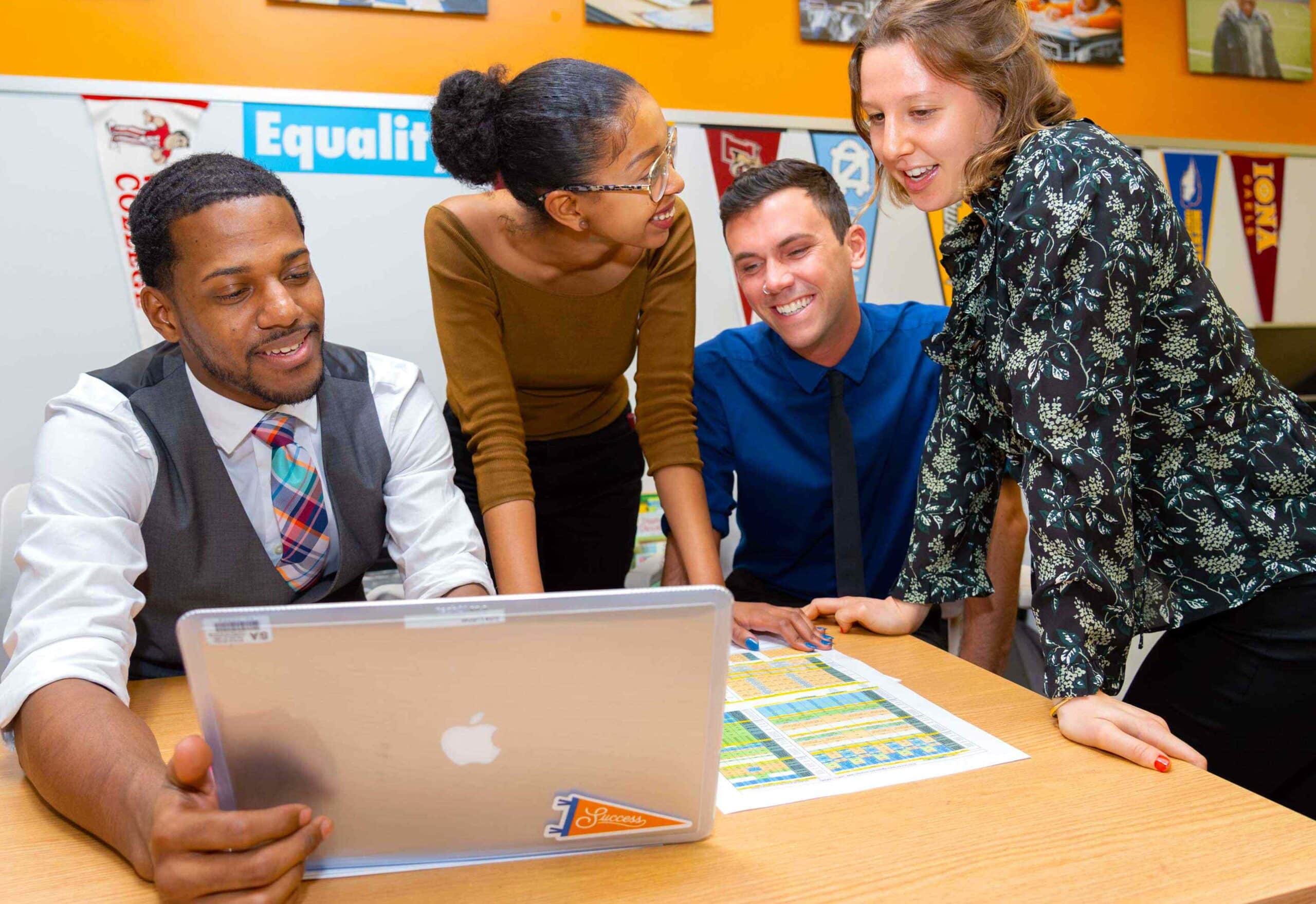Leaders from We Need Diverse Books, The New York Public Library, United Way of New York City, and Success Academy joined the Robertson Center to talk about the magic of an engaged, diverse reading culture in schools.

This post originally ran on New York School Talk.
As a former librarian, acclaimed YA author, co-founder of CAKE Literary, and COO of We Need Diverse Books, Dhonielle Clayton has some stories to tell.
On Tuesday, November 19, she came to the Robertson Center — a new learning and resource hub for public school educators and parents — to keynote The Radical Power of Books: How to Use Diverse, Engaging Stories to Set Students Free. Presented in partnership with the New York Public Library, the event attracted teachers, school leaders, librarians, and parents from all across the city and featured panelists from the NYPL, United Way of New York City, and Success Academy.
During her address, Clayton shared the story of Axel, a former student who was absolutely obsessed with books — the Percy Jackson series in particular.
“He couldn’t get enough of reading,” she said. “But one day he said to me, ‘I love these books. But how come there aren’t any about characters like me?’”
Determined to prove him wrong, Clayton scoured the shelves of every library and bookseller she could find, desperately searching for a story about a young black boy like Axel doing incredible, heroic things, like Percy.
“I couldn’t find one single book. Not one,” she said. “I was crushed. I just thought, ‘This is not fair.’”
Clayton’s keynote focused on the urgency of making sure every child can see herself in books, and strategies for making that a reality. She pushed for a nuanced approach to thinking about representation. “Are all your books about Native students set in the past? Is every black character overcoming adversity? My students asked me why there were no black heroes. They wondered why they never got to read about a black girl falling in love. I didn’t have a good answer.”
The organization she helped found, We Need Diverse Books, was born out of a desire to change this. What started as a hashtag, has now become part of a movement pushing for positive change and a more diverse set of stories in classrooms all over the country. But there’s still a long way to go — in 2018, Clayton shared, less than a quarter of books published told the stories of kids of color, compared to 27% centering on animals and inanimate objects.
For educators and librarians looking to diversify their collections, Clayton offered the trick that worked for her: create a “bookshelf balance checklist” of all the genres, formats, identities, and family structures you want to make sure you have represented on your shelves. Revisit it every year to take stock of what kinds of stories you have available and what gaps need to be filled. “And make sure all the books about people of color aren’t about slavery or poverty or sadness,” she said. “Witches, magicians, love stories, superheroes — kids of color deserve to see themselves in these things, too.”
After her keynote, Clayton joined a panel of other NYC literacy leaders to talk about more strategies for building a strong reading culture that unleashes the magic of books.
Lavinia Mackall, Managing Director of Schools at Success Academy, stressed the importance of pairing a passion for reading with a solid literacy foundation that equips kids with the phonetic tools, vocabulary, and decoding skills they need to unlock the meaning of the words on the page. It’s also crucial that the books kids read are high-quality, filled with rich language and ideas. “If they can’t do it, they won’t love it,” Mackall said of reading, “and if they don’t love it, they won’t do it.”
Tiffany James, School Outreach Librarian at the New York Public Library, recommended making sure kids have a choice about what they read to get them invested. “There might be the books they have to read for school or to work on their skills,” she said. “Pair that with a book they get to choose, and the only parameter for the choice book should be that they think they’ll love it.”
Also remember that narratives have power regardless of the form they take. “My first exposure to stories was through oral storytelling,” said Marielys Divanne, Vice President of Education at United Way NYC. “My grandparents would sit in rocking chairs on their porch in the Dominican Republic and I would just get lost in their stories.”
In that vein, several panelists suggested giving audiobooks a try, particularly if you find your child is resisting reading at the end of a long day at school. “Reading is thinking,” Mackall said. “It doesn’t matter so much if your child is reading the words or someone else is, as long as she’s hearing the stories and thinking about the ideas inside.”
Ultimately, the panelists agreed, your ability as an adult to influence your child’s love of reading will come less from what you say and more from what you do. If your child sees you reading often, and sees you reading a wealth of different kinds of stories, she’s likely to follow in your footsteps. “Think about how you’re exposing yourself to a diverse pool of writers, and talk about the stories you’re reading with your kids,” Divanne said. “It will get them excited to do the same.”
To conclude the event, Robertson Center Executive Director Becky O’Neill asked the panelists what they would challenge the audience to do to help them cultivate a passionate, equitable reading culture for themselves and the children in their lives.
“Open up the kinds of books you read, and don’t be afraid to try something new,” Clayton said. “If you’ve never read them, try graphic novels, try fantasies, try a book about someone from a nationality or family structure you’ve never read before. You might be surprised by how much you love it.”
"*" indicates required fields
Access a wide array of articles, webinars, and more, designed to help you help children reach their potential.
NEWSLETTER
"*" indicates required fields
